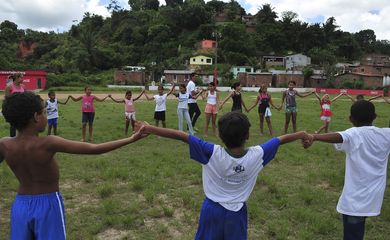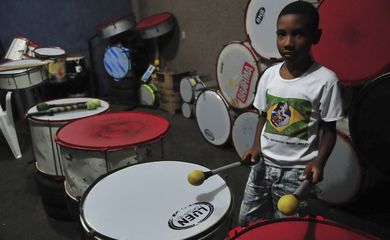The challenge of stopping sexual exploitation of children in Fortaleza


Fortaleza - Arena Castelão, one of the 2014 World Cup stadiums.

With all-year-round sunshine and a wealth of lovely beaches, Fortaleza, capital city of Ceará, in Northeast Brazil, has plenty of attractions to offer. But unfortunately, what some visitors are really after is sex tourism, often involving exploitation of children and adolescents.
The practice takes place openly in the streets, on the seafront, and in the vicinity of Arena Castelão, one of the 2014 World Cup stadiums. Girls in her early teens are approached by men driving cars and trucks. Stripped of their childhood, they are left with no prospects for a decent future, and remain hostage to exploitation.

Fortaleza - The girls usually have little educational background and are in vulnerable situations.
In an attempt to change this scenario, Associação Barraca da Amizade, a non-profit NGO working to protect children and youth in Fortaleza, offers courses and workshops for victims of sexual exploitation.
It relies on a staff that reaches out to children and adolescents on the streets looking to build a relationship of trust with them. Every week, they go all through the surroundings of the Arena Castelão stadium. Some younger girls keep a distance at first, but after a few encounters they are greeting people by their names and asking them for help. One of the girls, presumably at the age of 14 or so, seemed suspicious and not very willing to talk to reporters. Still, she said she is not afraid of being out on the streets despite all the violence she is exposed to.
Outreach coordinator Ivania de Andrade says the girls usually have little educational background and are in vulnerable situations. “Typically they don't go to school, and many don't even have a birth certificate. They are subject to exploitation, and so are their family and friends. What we want to do is, reach out to them and gradually help them out of this situation.”
As the World Cup approaches, there is a concern that the problem could become even worse with an expected turnout of 400,000 tourists – 65,000 from overseas, according to the Ministry of Tourism.
For Magnólia Said, of the Popular Committee on the World Cup in Fortaleza, the authorities and the population must work together to stop exploitation. She told about girls coming to Fortaleza from the countryside hoping that the event will create opportunities for them. “With large crowds of tourists flocking in, the World Cup could seem like an attractive opportunity for single women between 12 and 30 years old who dream of finding a 'Prince Charming',” she explained.

Fortaleza - Besides learning Portuguese and Mathematics with fun, the project's more than 170 participants, who live in the outskirts of Fortaleza, learn about their rights and responsibilities as citizens. -
Action plan
The local government has come up with an action plan to tackle the problem during the World Cup. It is planning to send 120 educators to the streets to talk to tourists and locals. The chairwoman of the local foundation for children, Tânia Gurgel, said they expect the population to use a dedicated help center that the foundation is setting up to receive reports throughout the 30 days of competition.
“There is a rationale to sexual exploitation, and there are key actors who need to understand this so they can help stop it. Taxi drivers, street and beach peddlers, hotel keepers, we're calling on them all to help us in our mission,” Tania said.
One such partner is Associação Recreativa e Esportiva para Crianças (ARCA), an organization that educates young children through sports. Besides learning Portuguese and Mathematics with fun, the project's more than 170 participants, who live in the outskirts of Fortaleza, learn about their rights and responsibilities as citizens. According to executive coordinator Milza Raadsen, exploitation can be prevented by giving opportunities to the families, and sport is one way of doing this.

Fortaleza - According to executive coordinator Milza Raadsen, exploitation can be prevented by giving opportunities to the families, and sport is one way of doing this.
“I think Brazilians are beginning to understand that the right to sport is much more than the right to play football – it's also the right to leisure, the right to have a day off to go to the park with the kids, or to go to the movies,” she argued.
Dreaming of having a beauty parlor, Raiane Marques, 12, has learned from the project that children have the right to study and play. She dresses up to go to ARCA, saying she is happy to be there learning new things and meeting friends.
Translated by Mayra Borges
Fonte: The challenge of stopping sexual exploitation of children in Fortaleza




